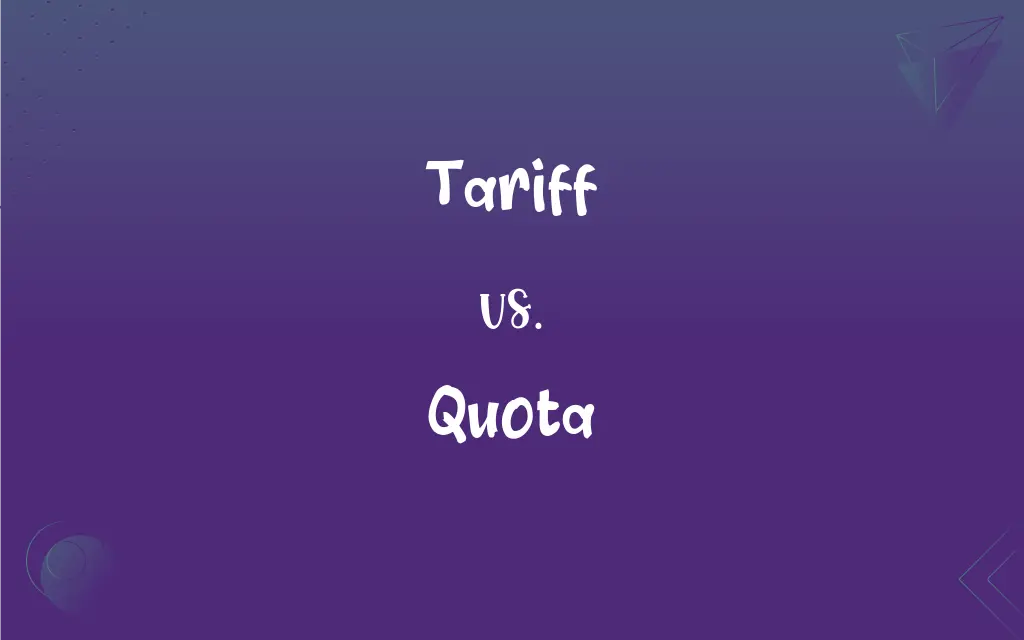Tariff vs. Quota: What's the Difference?
Edited by Aimie Carlson || By Janet White || Published on November 6, 2023
Tariffs are taxes on imported goods, while quotas are limits on the quantity of goods that can be imported.

Key Differences
Tariffs and quotas are both tools used by governments to regulate international trade, but they function differently. A tariff is essentially a tax that a country imposes on certain imported goods or services. Its primary purpose is to raise the price of the imported item, making domestically-produced goods more competitive. On the other hand, a quota restricts the quantity of a particular product that can be imported into a country during a specific period.
When a government implements a tariff, it generates revenue for the country's treasury. For example, if a tariff is placed on imported cars, every car imported will incur that tax, providing funds to the imposing country. In contrast, a quota does not necessarily generate direct revenue. Instead, by limiting the quantity of a specific import, a quota protects domestic industries from being overwhelmed by excessive foreign competition.
The effects of tariffs and quotas on consumers can vary. Tariffs tend to increase the price of imported goods, potentially benefiting domestic producers but at a cost to consumers who pay higher prices. Quotas, by limiting supply, can also drive up prices, but they mainly protect domestic industries by ensuring only a certain number of competing foreign products enter the market.
It's important to note that while tariffs are mainly fiscal tools designed to raise revenue and protect domestic businesses, quotas have a more direct impact on the volume of trade. A country might employ quotas for various reasons, including conserving domestic resources, safeguarding specific industries, or managing trade relationships with particular nations.
Lastly, while both tariffs and quotas can be employed for protectionist reasons, they can sometimes face criticism. Opponents argue that such measures can distort free trade, leading to inefficiencies in the global market. However, proponents believe tariffs and quotas can be essential for protecting domestic interests and maintaining economic balance.
ADVERTISEMENT
Comparison Chart
Nature
Tax on imported goods.
Limit on the quantity of imported goods.
Purpose
Increase price of imports & generate revenue
Limit supply & protect domestic industries.
Impact on Consumers
Potentially higher prices for imported goods
Limited availability & potentially higher prices.
Revenue Generation
Generates revenue for the government.
Does not generate direct revenue.
Trade Volume Influence
Influences based on price adjustments.
Directly restricts the volume of imports.
ADVERTISEMENT
Tariff and Quota Definitions
Tariff
A fiscal tool affecting international trade prices.
The new tariff policy aims to protect domestic industries.
Quota
A predetermined limit for product imports.
The annual sugar import quota was quickly reached.
Tariff
A duty levied on products crossing international borders.
The tariff on electronics was raised to promote local manufacturing.
Quota
A volume control mechanism in international trade.
To protect local farmers, a quota was set on imported grains.
Tariff
Revenue-generating tax on foreign products.
The treasury benefited from the tariffs imposed on imported wines.
Quota
A restriction on the amount of a good that can be imported.
The country set a quota on the import of foreign-made textiles.
Tariff
A trade barrier impacting the cost of imports.
With the new tariff in place, the imported shoes became pricier.
Quota
A limit set to manage trade volumes.
The government's quota on electronics impacted several overseas suppliers.
Tariff
A list or system of duties imposed by a government on imported or exported goods.
Quota
A proportional share, as of goods, assigned to a group or to each member of a group; an allotment.
Tariff
A duty or duties so imposed.
Quota
A production assignment.
Tariff
A schedule of prices or fees.
Quota
A number or percentage, especially of people, constituting or designated as an upper limit
A country with strict annual immigration quotas.
Tariff
To fix a duty or price on.
Quota
A number or percentage, especially of people, constituting a required or targeted minimum
A system of quotas for hiring minority applicants.
Tariff
A system of government-imposed duties levied on imported or exported goods; a list of such duties, or the duties themselves.
Quota
A proportional part or share; the share or proportion assigned to each in a division.
Tariff
A schedule of rates, fees or prices.
Quota
A prescribed number or percentage that may serve as, for example, a maximum, a minimum, or a goal.
Tariff
(British) A sentence determined according to a scale of standard penalties for certain categories of crime.
Quota
A restriction on the import of something to a specific quantity.
Tariff
(transitive) to levy a duty on (something)
Quota
A proportional part or share; the share or proportion assigned to each in a division.
Tariff
A schedule, system, or scheme of duties imposed by the government of a country upon goods imported or exported; as, a revenue tariff; a protective tariff; Clay's compromise tariff. (U. S. 1833).
Quota
A share of effort required to be performed, or a share of resources required to be contributed to some common purpose.
Tariff
The duty, or rate of duty, so imposed; as, the tariff on wool; a tariff of two cents a pound.
Quota
A prescribed number;
All the salesmen met their quota for the month
Tariff
Any schedule or system of rates, changes, etc.; as, a tariff of fees, or of railroad fares.
Quota
A proportional share assigned to each participant
Tariff
To make a list of duties on, as goods.
Quota
A limitation on imports;
The quota for Japanese imports was negotiated
Tariff
A government tax on imports or exports;
They signed a treaty to lower duties on trade between their countries
Quota
A trade regulation determining quantity, not price.
The quota system ensured that only a specific number of cars were imported.
Tariff
Charge a tariff;
Tariff imported goods
Tariff
A tax imposed on imported goods or services.
The government placed a high tariff on luxury cars.
FAQs
How does a quota directly impact trade?
A quota sets a limit on the quantity of a specific product that can be imported.
Who benefits from the revenue generated by tariffs?
The government imposing the tariff collects the revenue.
Do quotas apply to both imports and exports?
While quotas are primarily used for imports, they can also be applied to exports in certain situations.
What is the main purpose of a tariff?
A tariff's primary purpose is to tax imported goods, raising their prices and potentially protecting domestic industries.
What happens if a country exceeds its quota?
Exceeding a quota can result in penalties, additional tariffs, or the excess goods being turned away.
Why would a country implement a quota?
To protect domestic industries, conserve resources, or manage specific trade relationships.
Can tariffs change frequently?
Yes, tariffs can be adjusted based on economic conditions, diplomatic relations, or trade strategies.
Can a country use both tariffs and quotas simultaneously?
Yes, a country can employ both tariffs and quotas to regulate different aspects of trade.
Are tariffs always imposed for protectionist reasons?
While tariffs are often used for protectionism, they can also be employed for diplomatic reasons or to generate revenue.
What is a binding quota?
A binding quota is a hard limit on imports, which, once reached, prevents further imports of that product.
How do tariffs affect domestic consumers?
Tariffs can lead to higher prices on imported goods, impacting domestic consumers.
Are tariffs and quotas considered barriers to trade?
Yes, both are trade barriers, affecting the flow and pricing of international trade.
How do quotas protect domestic industries?
By limiting foreign competition, quotas help ensure domestic producers maintain market share.
How are tariff rates determined?
Tariff rates can be set based on diplomatic agreements, trade policies, or economic strategies.
Why are tariffs criticized in global trade?
Tariffs can distort free trade, potentially leading to inefficiencies and trade conflicts.
How do tariffs impact foreign producers?
Tariffs can make foreign products less competitive in the imposing country, affecting sales.
Can a quota result in increased product prices?
Yes, by limiting supply, quotas can drive up prices due to reduced competition.
Are quotas permanent?
Quotas can be temporary or permanent, depending on trade policies and objectives.
Do quotas apply to all types of goods?
No, quotas are typically applied to specific goods or categories deemed important for economic or strategic reasons.
What's the difference between a specific tariff and an ad valorem tariff?
A specific tariff is a fixed fee per unit, while an ad valorem tariff is based on the product's value.
About Author
Written by
Janet WhiteJanet White has been an esteemed writer and blogger for Difference Wiki. Holding a Master's degree in Science and Medical Journalism from the prestigious Boston University, she has consistently demonstrated her expertise and passion for her field. When she's not immersed in her work, Janet relishes her time exercising, delving into a good book, and cherishing moments with friends and family.
Edited by
Aimie CarlsonAimie Carlson, holding a master's degree in English literature, is a fervent English language enthusiast. She lends her writing talents to Difference Wiki, a prominent website that specializes in comparisons, offering readers insightful analyses that both captivate and inform.






































































